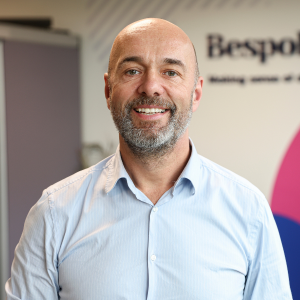
7 minutes
The benefits of a marketing retainer go beyond its results.
In this video, Phil and Steve explain the benefits of an agency retainer for a marketing person or team. It can help build best practice marketing routines, grow digital skills and support staff retention.
We've been delivering successful marketing retainers for over 20 years, generating 100,000s of leads for our clients. This knowledge is shared based on our real-life experience.
Phil: So Steve, I suppose we're both 20 plus years doing this and, you know, we've lots of experience to draw on. And also we’ve had quite a number of these types of these conversations, the team and the rest of the team as well. And the topics and themes that we've covered, many of them, I guess, are the sorts of things you would expect us to cover, you know, what are the successful ingredients that make a good ROI for a marketing retainer? And there are many benefits, but I guess what I'd like to explore is, in all that experience that you've gained over the years, what are some of the more unspoken or less clear additional benefits that you get from?
Steve: I like this topic even though, well, I mean, it's unspoken that that's what we're saying, isn't it? These are the things you would never see, these things mentioned, I don't think in your, you know, marketing material for marketing campaigns or retainer. But yeah, there's more going on when you've got retainer running, if it's the right retainer and if it's within aligned agency and so on. So when a retainer is in place, we're normally engaged with a marketing person or a marketing team in the business, somebody is responsible for marketing anyway. And our senior or expert or specialist staff are in touch with that person or that team, I mean all year round and sometimes for three, five, eight, ten, fifteen years. You know, the retainers last years and years and years. But what's the impact of that? I think it's interesting because when your marketing team or marketing person sort of dovetails with an agency, that’s in your sector and working with companies of your size and is, the agency is seeing best practice across not one but ten, twenty, thirty businesses. So they're even seeing how all the other marketing teams are structured. And it can't help but that best practice, that experience, you can't help but share that by osmosis. Just all the little conversations, the little check-ins, and just putting the structure in place for what's the activity? What's the routines? What's the tactics? Who's responsible for what? What does reporting look like? And it ends up you've got a best practice marketing routine in place that's sort of been imprinted into your marketing team or marketing person. Even though it wasn't the main purpose of the retainer, it's a by-product of just having a really well-aligned retainer, I think.
Phil: I think what you're saying is, obviously there's all the obvious benefits of a successful marketing retainer for business growth and leads and sales, et cetera. But you're talking about really the sort of dynamic between the marketer here and the marketing person on the client side, is that that really improves their performance, improves their knowledge, and we can sort of impart that distilled knowledge that we have onto the team.
Steve: And obviously, the in-house team or the in-house marketer, whoever is responsible for marketing, they've got an experience of their own that we can't replace. We can't, you know, we still need that, you need that deep product knowledge, that knowledge of what's going on day to day, so that it doesn't diminish the in-house team's value at all. But it has to only help those people in that team and that function of the business develop well. You know, because we’re mature 25 years and whatever 200 websites and, you know, lots and lots of retainers. So we've seen best practices from all different size of businesses and wherever the business we’re working with is going next, somewhere else, that next size business is being managed by someone a couple of the desks away, so it can't help but develop I don't think, that dynamic.
Phil: So I guess it helps, it obviously helps the individuals, doesn't it? It also helps those embed those routines, the ones that we're used to.
Steve: Yeah. Another thing we could share here actually is, there’ve been some examples maybe less so recently, actually. But if I think back over years and years, I can think of examples where we're in our face-to-face end of month meeting with the client, and the Marketing Manager, a Marketing Executive is sort of, unloading some frustrations a little bit like ‘they want me to get the result, but there's not the budget’ or ‘they want to get result, but were a person short’ or ‘they want to get a result, but there's a lack of clarity here’ or ‘I can't get this asset’ or whatever it is. We've come out of them sometimes saying, I mean, we’ve done their report, but then it's been a bit like a bit of counselling at the end, they're really frustrated. But what we find is we can fill in some of these gaps of what the in-house person needs and be the support, and that can lead to a continuity. Like what a continuity, that the, you know, the member staff can stay for longer, just in its most basic form because the frustrations, you know, they’re not isolated. But also there's a continuity that well, we've got our retainers that have been running for three, five, eight, ten, fifteen years. There's a line of consistency, of understanding of what's needed there that in some cases has outlived the staff. So the retainer might cost the same as a member of staff, but actually it's a member of staff that's always going to be a constant and it's always going to be best practice, and it's just going to help the other members of staff, you know, thrive really.
Phil: I think the way you describe it is that these don't come in the moment. These benefits come after perhaps long-term relationships and many years of experience.
Steve: Yeah. So one, the repetition of, you know, the same quarterly activity and getting the same results and there's something there. But also the longer a retainer stays in place, the deeper the knowledge the agency has of that business's ideal customer and product, and key messages and competitors and position in the market and so on. So we can be like, almost the agency, if it's well matched and if it's the right agency, it just brings a constant. It's almost like having a set of brand guidelines or a digital strategy that's always there. You could swap out the people internally over time. You know, it might change, but actually there's this continuity. It's always going to get a result because there's just that consistent best practice running alongside the team all the time.
Phil: And I guess that could only really build and enhance what comes first and foremost, which is the results. The ROI and the results. These are layers above and beyond that, aren’t they?
Steve: Yeah, and you know, you’re always able to get a good result in year one or you know, maybe second half of year one, in some cases it takes a while to build up enough data and so on. But yeah, years two, three and four, I mean you’re really flying and then there can come a point where there's enough osmosis of a, you know, building up these routines that the in-house team says, ‘actually we can take this from here’ and then we can step aside and the marketing function is built.
Phil: Yeah. Excellent, thanks, Steve.

